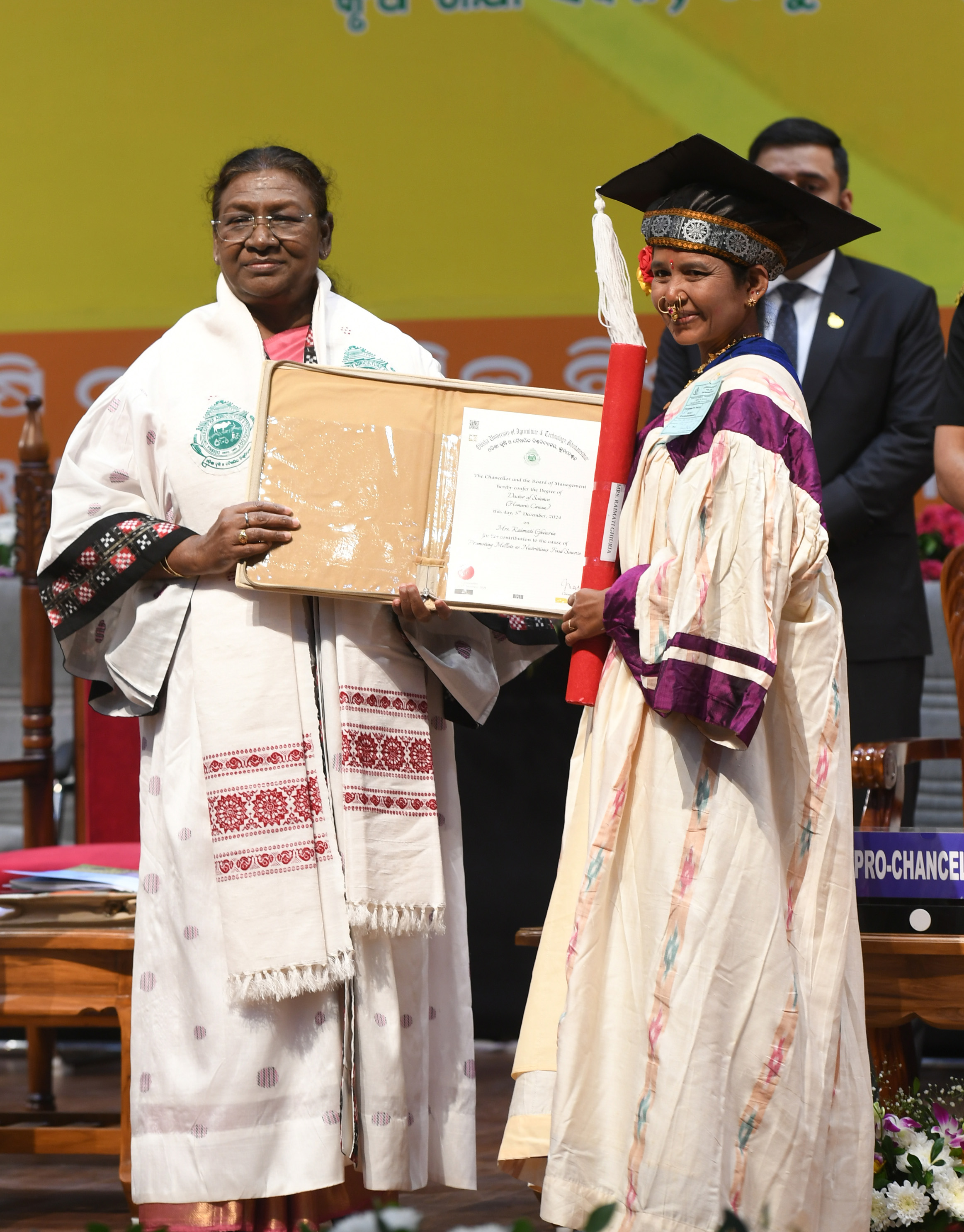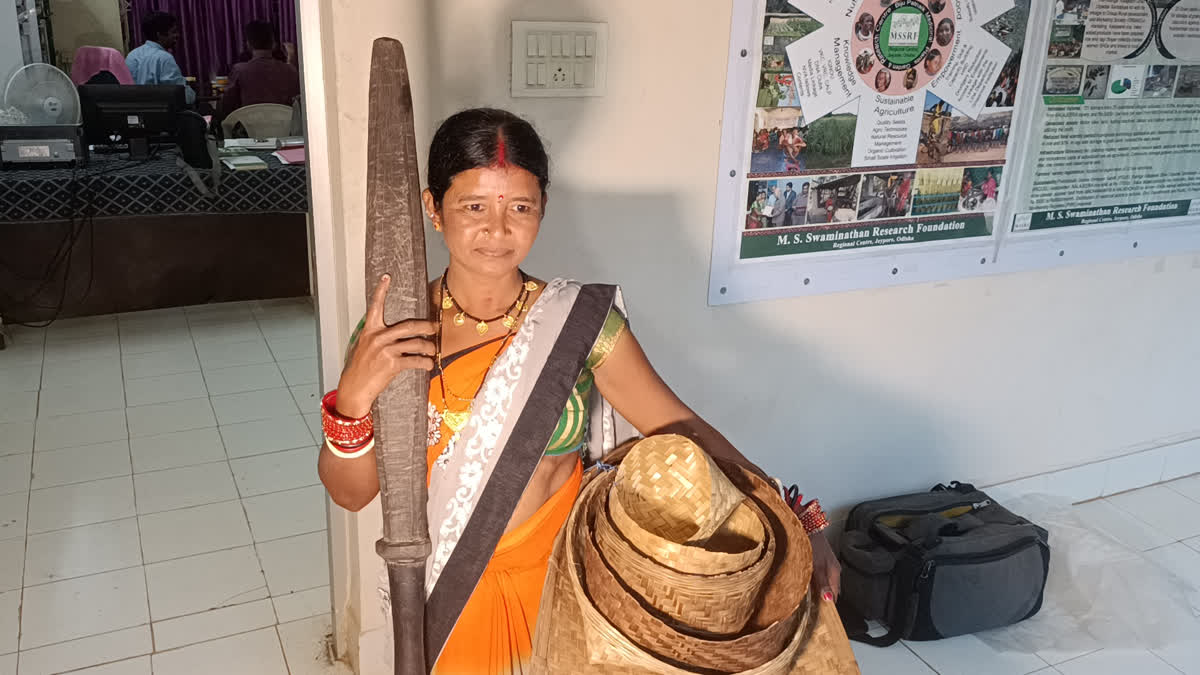Koraput/Bhubaneswar : When Raimati Gheuria, a tribal farmer from Koraput’s remote Nuaguda village, walked up to receive her honorary doctorate from President Droupadi Murmu, the applause wasn’t just for her—it was for every seed she had sown to preserve India’s rich millet heritage. From the rugged hills of Koraput to the OUAT’s convocation, Raimati’s journey is a witness to the transformative power of dedication, tradition, and innovation.
Thursday, December 5, marked a historic moment for Odisha’s millet mission. For Raimati, known as the Mandia Rani (Queen of Millets) in her community, the recognition was not just personal—it celebrated a decades-long struggle to preserve and promote traditional grains, the backbone of sustainable farming in the region.
Hailing from Kundura block, Raimati’s journey began in the fertile yet challenging terrains of Koraput, a district renowned for its biodiversity and indigenous farming practices. Inspired by her ancestral methods, Raimati committed herself to conserving traditional rice and millet varieties that were rapidly vanishing under the onslaught of modern agriculture.
Today, she stands tall as a farmer, trainer, and leader, having conserved 72 traditional rice varieties and 30 millet types, including Koraput’s prized Bati Mandia and Mami Mandia. These grains are not only nutritious but also resilient to climate challenges.

A Role Model for Women Farmers
Raimati’s contributions extend beyond her own fields. She leads the Bamandai Farmers Producers Company Limited, an FPO she helped establish in Nuaguda. The FPO has become a hub for bio-fertilizers, bio-pesticides, and millet-based value-added products. Under her guidance, it has empowered hundreds of farmers, especially women, to embrace organic farming and market their produce effectively.
But perhaps her most remarkable achievement is the farm school in her village. Established in 2012 on land donated by her family, the school serves as a center for knowledge exchange, teaching farmers the importance of local genetic resource conservation and sustainable agricultural practices.
Recognition and Global Impact
Raimati’s work has earned her numerous accolades over the years. She was part of the team that won the Genome Saver Community Award in 2012, and her efforts have drawn the support of institutions like the Swaminathan Research Foundation. According to its director, Prashant Parida, Raimati’s dedication to organic millet cultivation has made her a global ambassador for traditional farming methods.
Her voice reached international platforms, including the G-20 conference in Delhi, where she presented her insights on Koraput’s traditional millet varieties. Her knowledge and experience became a beacon of hope for millet farmers worldwide, particularly in 2023, during the United Nations-declared International Year of Millets.
Agriculture officer Tapas Chandra Rai expressed his pride, stating, “While the world celebrates millets, Raimati has been a shining example of how traditional knowledge can shape the future of sustainable farming. Her efforts are a reminder that Koraput’s ragi can hold its own on the global stage.”
Walking the Path of Legends
Raimati’s journey draws parallels with another iconic figure from Koraput, Padma Shri Kamala Pujari, who brought international attention to traditional rice conservation. Like Kamala, Raimati has carved her own niche, bringing glory to Koraput’s agricultural heritage.
Her contributions to millet conservation have also had a profound impact on Odisha’s millet mission, a flagship program of the state government aimed at reviving these ancient grains. The program, which aligns with Raimati’s life’s work, emphasizes the importance of millets in combating malnutrition, improving farmer incomes, and ensuring food security.
An Emotional Milestone
For Raimati, receiving the honorary doctorate was a deeply emotional moment. “I never imagined that the work we have been doing for generations would one day bring me to such a platform. This honor is not mine alone—it belongs to the soil of Koraput and to every farmer who continues to believe in the power of our traditions,” she said with tears in her eyes.
Her story resonates far beyond the fields of Nuaguda. It is a tale of resilience, leadership, and the enduring bond between a farmer and the land. As she stood on the stage, holding her honorary doctorate, Raimati symbolized the promise of a sustainable future rooted in the wisdom of the past.
President Droupadi Murmu graced the convocation ceremony of the Odisha University of Agriculture and Technology at Bhubaneswar, Odisha. The President said that climate change related issues such as rising temperatures and increases in greenhouse gases are affecting agricultural… pic.twitter.com/6iqkZwosxK
— President of India (@rashtrapatibhvn) December 5, 2024
President's Address
Speaking on the occasion, the President said that the convocation day of OUAT opens the path to the promising future of students. She told students that they are now entering a different ecosystem in which they will face rigorous tests of their knowledge and skills in real-world situations. They are expected to contribute to nation-building through the best application of the knowledge and skills they acquire. She urged them to contribute to the national goal of making India a developed nation by 2047 through their innovative ideas and dedicated actions, stated A PIB release.
"There was a time when we were dependent on other countries for food grains. Now we are exporting food grains and other agricultural products. This has been possible due to the guidance of our agricultural scientists and the tireless hard work of our farmers," the President further stated.
The President also said that the overall development of the country is not possible without the development of agriculture and farmers. Our economy can be strengthened by the development of agriculture, fishery production, and livestock. She said, "Today, agriculture is facing new challenges such as natural disasters, adverse effects of climate change, decreasing per capita farm size, and excessive exploitation of natural resources. To deal with these challenges, our scientists will have to develop and disseminate technologies timely. We have to emphasize on environmental protection, soil health protection, water and soil conservation, and better use of natural resources."



